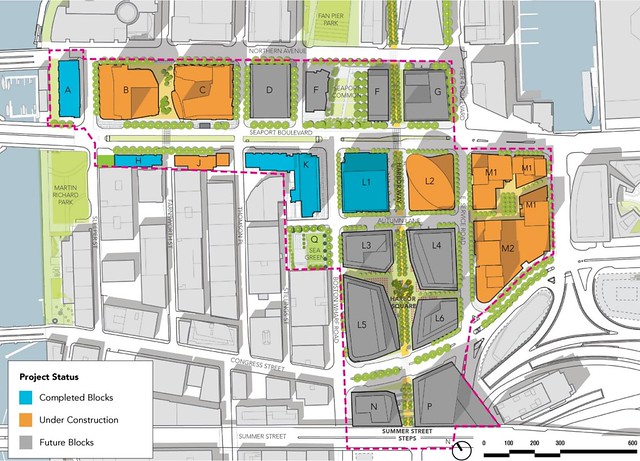Recruiting Vertex with tax incentives based on the public from Cambridge to lower the developers costs to build is not really private dealings here. You are involving the overall public to cut you a deal to build. What is the overall public receiving for generous tax deals?
Also the taxpayers dumped in over 100's of millions of tax dollars to build infrastructure costs for the developers. Again Fallon did not pony up private money to help build infrastructure. The taxpayers did.
You're out of your mind to believe that this all private investment dealings. The developers can't even give the public incentive anymore the taxpayers have to give the developers incentive now.
I could support tax deals if they benefitted the public but what is going on with the Seaport is an exchange of Developers enriching themselves to the max then ripping off the public only to create union jobs for votes for the politicians. The public did not really receive a benefit that the 100's of millions of dollars that was focused on the area.
(The public got SWINDLED here)
Ask yourself why a 2 family in the surrounding areas in Boston cost a million dollars to buy but the city of Boston giving tax deals to corporations to build on PRIME PROPERTY
Here is the list:
#1 Fallon (Vertex)
#2 GE
#3 Liberty Mutual
#4 JPM
#5 Millennium group
Should I go ON? Private Land & Private investment are you NUTS. The taxpayers have been subsidizing these corporations to build their wealth on the backs of the working class.
At least 100+Million in tax incentives up above for those billion dollar corps.
This is a development forum. I understand that and I am as guilty as some others who get a little off-track here and there, getting into the economic, political, and socio political sides of things (though of course, all are intertwined). That being said, it's difficult to ignore when someone posts something so skewed and misinformed. So, I'm sorry, but here I go again..
"100's of millions of tax dollars to build infrastructure costs for the developers"
What are you talking about here specifically? Please exclude the Big Dig, the harbor clean up, and Williams tunnel since they benefited Boston as a whole and were not done because of Seaport developers. In fact, exclude the Silver Line through Seaport as well. That infrastructure allowed a route from South Station to the airport. The primary intermittent stops include the courthouse and trade center, both there long before the Seaport as we know it today. Yes, these projects were enablers, but to say that average Joe's 100's of millions of hard earned tax dollars went to infrastructure to developers is, in my opinion, ludicrous.
Tax Deals
You list a number of companies here, but I'll just address one (perhaps to the relief of some readers here). Vertex, #1 on your list. They were given tax incentives in 2011 to relocate. Why? To screw over taxpayers? I personally don't think so. Companies were generally still recovering from the recession. I imagine any plans for physical expansion and growth were secondary for a lot of them. But Vertex had potential with a new, but still risky blockbuster treatment approved for Hep C. They didn't need to move, but there was a pretty good deal on the table.
You need to understand the deal itself though. The incentive was based on building a $800 million facility AND employment targets over X years. Yes, Fallon got his $ as the developer, but you know who else did? Of course you do. Construction workers, contractors, sub contractors, every industry that benefits when a single house gets built X 1000. Vertex also needed to increase
local employment by 500. They actually ended up falling short of this target by about 25% (because their blockbuster drug suddenly fizzled out due to a competitor) and a proportional amount of the incentive tied to employment was actually clawed back. All this is in the Globe by the way.
So the answer to your question of what public money went towards on the Vertex deal:
1) Jobs, taxable income on those jobs, and the economic multiplier effect therein,
2) Buildings that generate property tax revenue, and increasingly so due to value of the area
driven by continued development.
It's only "subsidizing" as you define it if you continue to fail to see the other side of the equation.










